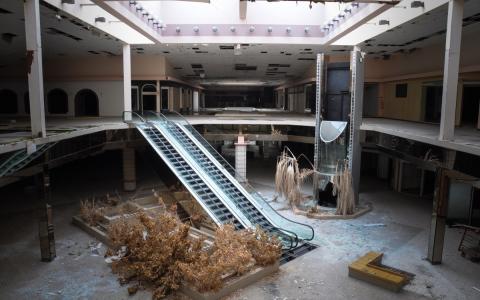
Headlines were hyping up a retail apocalypse a few years back. But then 2020 hit. This is the real retail apocalypse, if we’ve ever seen one.
The coronavirus pandemic has now put 10% of the U.S. workforce out of a job in a matter of three weeks, based on the latest jobless claims data released Thursday morning. Hundreds of thousands of people in the retail industry have either been furloughed or permanently laid off, from companies ranging from Macy’s to Gap to TJ Maxx. Prior to this crisis, one in four U.S. jobs was in retail trade. What is that going to look like now?
JP Morgan is forecasting the overall unemployment rate in the U.S. could surge to 20%.
The pain will continue to trickle into the mall industry, as stores sit closed for business for weeks on end. Some department store chains - malls’ core anchor tenants - could be pushed into bankruptcy if their sales declines steepen, and liquidity dries up. Simon Property Group has already furloughed a portion of its company.
The issue weighing heavy on many of these operators are ongoing rent discussions. Based on reports, dozens of retailers and restaurant chains including The Cheesecake Factory, WeWork and Staples have already said they will not be paying April rent, with their locations temporarily dark to try to help stop the spread of COVID-19. Nobody knows when they will be reopening. We would expect an even larger number of mom-and-pop or small business owners are not sending in those rent checks.
The fact that the government’s $350 billion Paycheck Protection Program to help Main Street is seemingly running behind schedule, with delays, certainly isn’t helping.
Some developers have taken a bolder and more public stance on the issue. Related Companies CEO Jeff Blau joined CNBC earlier this month to argue that the coronavirus pandemic shouldn’t be used as a reason for everybody to stop paying rent.
Blau told CNBC that Related Companies’ has collected about 88% of its residential rents that were due April 1. About 95% of commercial rents were paid, but only 26% of retail tenants have done so, he said. Only 26%.
“This is not an excuse for people to not pay rent,” Blau emphasized.
Mall owners have their own bills to pay, hence the stress. Some that are not well capitalized could be at a greater risk of defaulting on a mortgage payment. We could see some operators forced to hand the keys over to their lenders.
Macerich, among other REITs, has already cut its dividend. Others are drawing down lines of credit to survive.
With roughly 1,100 shopping malls across the U.S., America was already over-retailed, even prior to the coronavirus. The demise of many of these centers was already inevitable. Now, that will only be accelerated.
We will gain a much better sense of how these rent conversations are panning out when companies like Simon, Macerich and Taubman report quarterly earnings. We anticipate a bloodbath. With a situation so unprecedented, it’s hard to make much of a prediction beyond that.
This article originally appeared on Forbes.



